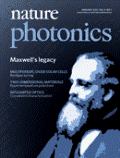
Qian Zhang, Bin Kan, Feng Liu, Guankui Long, Xiangjian Wan, Xiaoqing Chen, Yi Zuo, Wang Ni, Huijing Zhang, Miaomiao Li, Zhicheng Hu, Fei Huang, Yong Cao, Ziqi Liang, Mingtao Zhang, Thomas P. Russell & Yongsheng Chen
Nature Photon, 2015, 9: 35-41 [ pdf ]
At present, state-of-the-art single-junction organic photovoltaic devices have power conversion efficiencies of >9% and >8% for polymer- and small-molecule-based devices, respectively. Here, we report a solution-processed organic photovoltaic device based on DRCN7T, which employs an oligothiophene-like small molecule with seven conjugation units as the backbone and 2-(1,1-dicyanomethylene)rhodanine as the terminal unit. With [6,6]-phenyl C71-butyric acid methyl ester (PC71BM) as the acceptor, an optimized power conversion efficiency of 9.30% (certified at 8.995%) is achieved. The DRCN7T-based devices have a nearly 100% internal quantum efficiency, which we believe is due to an optimized nanoscale interpenetrating donor/acceptor network (with highly crystalline donor fibrils with diameters of ∼10 nm, close to the exciton diffusion length in organic materials) and the use of an efficient electron transport layer.
